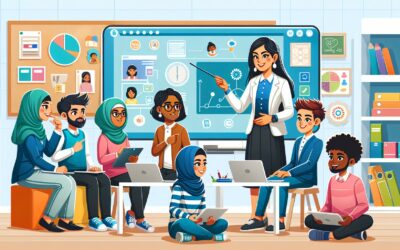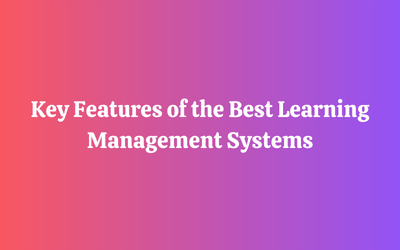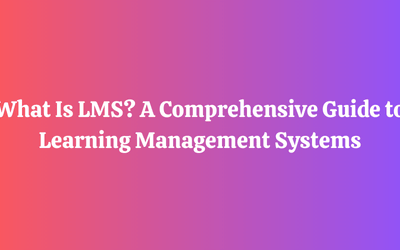Artificial Intelligence in Learning Management Systems
Artificial Intelligence in Learning Management Systems
Introduction
Artificial Intelligence (AI) is a field of computer science that deals with the design and development of intelligent systems that can perform tasks that are not considered possible by human beings. Artificial intelligence is also used to describe the use of these technologies in everyday life. let’s learn what value Artificial Intelligence in Learning Management Systems holds.
A learning management system (LMS) is a software application for the administration, documentation, tracking, reporting and delivery of educational courses or training programs.
A learning management system (LMS) is a software application for the administration, documentation, tracking, reporting and delivery of educational courses or training programs. It can also be used to facilitate online discussions with students in real time regarding their progress towards completion of coursework.
The primary purpose of using an LMS is to provide teachers with access to tools that will allow them to improve student engagement by providing them with information about what they need at each stage of learning. In addition it allows teachers to create custom lesson plans based on what specific groups within your school need from you as well as how much time each group has available every week/month so you don’t overload yourself trying too many things at once! The benefits include:
- Improved classroom management – Students get more involved since they see results immediately after completing tasks
- Better attendance rates – Students know if they’re doing their part correctly so there’s no confusion about where things stand
The objective of AI in an LMS is not to replace the person but to improve the learning experience by complementing instructors and students.
The objective of AI in an LMS is not to replace the person but to improve the learning experience by complementing instructors and students.
The following are some of the ways that AI can be used:
- AI can help students with their learning. For example, it could provide feedback on how well they are understanding content or even suggest new courses based on what you’ve learned so far.
- The AI system itself can also learn from its interactions with people–for example, if you’re using a word processing program on your computer and then switch over to your smartphone again without closing out the first app completely (which happens automatically), chances are good that both apps will open up at once! The same thing happens when we switch between different applications within an online course environment; all these changes happen simultaneously because each browser has its own separate set of tabs open at any given time–but since we don’t close them off completely until after we’ve finished working through our day’s tasks (and sometimes even forget about them entirely), this means all those tabs still exist after shutting down each tool individually before shutting down everything together as one process ends immediately upon clicking Home button (or whatever equivalent button exists for closing windows). This means that every time I go into my email inbox instead of finding what I’m looking for quickly enough? There’s probably another message waiting too!
Artificial Intelligence in Learning Management Systems – The technologies that are most relevant to learning are chatbots, machine learning and natural language processing.
The technologies that are most relevant to learning are chatbots, machine learning and natural language processing.
Chatbots are a type of artificial intelligence that can be used to interact with users through text or voice. They can answer questions and perform tasks for users by using programmed instructions called scripts. The technology is still in its infancy but it has the potential to change how people interact with businesses and make interactions more efficient by automating common tasks such as scheduling appointments or ordering products from websites like Amazon.
Machine Learning is an application of artificial intelligence that can provide recommendations and predictions based on data.
Machine learning is an application of artificial intelligence that can provide recommendations and predictions based on data. Machine learning uses statistical methods to find patterns in large amounts of data, often by making use of neural networks (a type of machine learning algorithm).
Machine learning algorithms have been used in the past for tasks such as detecting spam emails or finding vulnerabilities in software. However, they are now being used for more practical purposes like helping us make better decisions about our lives:
- Recommendations for products based on your preferences;
- Personalized newsfeeds;
Natural Language Processing (NLP) is a subfield of computer science and artificial intelligence concerned with the interactions between computers and human languages
Natural Language Processing (NLP) is a subfield of computer science and artificial intelligence concerned with the interactions between computers and human languages. The field’s goal is to enable computer systems to understand natural language.
NLP enables computers to recognize patterns in text and speech, making them more efficient at processing information. It can be used for tasks such as machine translation, search engines, automated customer service systems, speech recognition (e.g., Siri), knowledge representation databases like WordNet or DBPedia
Chatbot for LMS can be used as virtual assistant that could help learner 24/7.
Virtual assistants can be used as a help desk, where they provide answers to learners’ questions and resolve their issues. They also provide information on various topics related to learning management systems (LMS).
A chatbot can be used in the following ways:
- To provide assistance on a specific subject or topic. For example, if you’re having trouble with a particular course in your current LMS, you could use a chatbot to ask it questions about that course’s content and find out what resources are available for further study. This way your virtual assistant will act like an information portal for students who need help with specific courses in their LMSs or those who want access to free educational materials online (like videos).
Artificial Intelligence will revolutionize the way we learn.
Artificial Intelligence will revolutionize the way we learn.
When you think about it, AI has the potential to do more than just make your coffee or put together an outfit for you. It can also help you learn new things and make better decisions in life. The idea behind this technology is that by using artificial intelligence (AI), computers can become smarter than humans. They have been programmed with all kinds of knowledge about everything from geography to history and even some random facts from popular culture: so if someone asks them a question like “What’s your favorite color?” or “Who was Harry Potter’s father?” they’ll give you an answer without fail!
Artificial Intelligence in Learning Management Systems – Conclusion
As you can see, the future of learning is artificial intelligence. LMS are already being used in classrooms across the globe to help students learn at their own pace and pace them with virtual assistants. Chatbots have also been developed that can interact with learners on social media networks such as Facebook Messenger and Twitter. With these technologies combined, it’s clear why so many educators are excited about how AI will revolutionize their classrooms!
Learn Bytecasting an AI integrated LMS and various services like LXP.
Our News
- AI
- Animations
- Articulate
- Articulate 360
- Articulate Engage
- Articulate Live
- Articulate Presenter
- Articulate Quizmaker
- Articulate Replay
- Articulate Review
- Articulate Storyline
- Articulate Storyline 3
- Articulate Studio
- bite sized learning
- Characters
- Content Library
- Corporate Communication
- E-Learning
- e-Learning Authoring Tools
- Employee Engagement
- Game-Based Learning
- Gamification
- Gamiflexer
- Go Sales
- Healthcare
- Instructional Design
- Interactivity
- Knowledge Transfer
- L&D Trends
- Learning
- Learning & Development
- Learning Experience platform
- Learning Management System
- LMS
- LXP
- Microlearning
- mLearning
- Mobile Learning
- Nugget Learning
- Online Training
- Peek
- Performance Support
- Preso
- Quiz and Assessment Platform
- Replay 360
- Rise
- SCORM
- Screen Capture
- Software
- Storyline 360
- Studio 360
- Training Management
- Trainings
- Uncategorized




